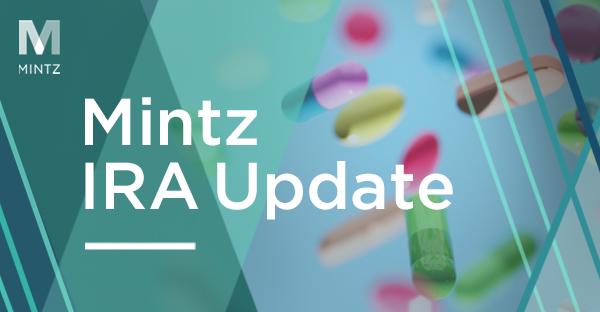Mintz IRA Update — From the Desk of ML Strategies: The Medicare Drug Price Negotiation Program Under the Second Trump Administration
The start of Donald Trump’s second presidency and Republican control in the 119th Congress raises questions about the future of the IRA’s Medicare Drug Price Negotiation Program (the Negotiation Program), which could be significantly modified by the Trump administration and by Republicans in Congress.
President Trump himself has been silent about the future of the Negotiation Program. On the campaign trail, Trump did not discuss the program, nor has he since released a policy plan related to the program. While Project 2025 did call for a repeal of the Negotiation Program, Trump during his first term was largely supportive of efforts to reduce drug prices and is unlikely to repeal the program unless he has a replacement for it. The first Trump administration did advance a most favored nation drug model for drug pricing, which would tie drug prices to those paid in other high-income countries. Stakeholders are keeping close eyes and ears on whether President Trump will once again advocate for this plan during his second administration.
During his first week in office, President Trump issued an executive order (EO) repealing several Biden administration executive orders on healthcare, but this EO did not touch the Negotiation Program. Trump revoked a Biden EO that had directed the Center for Medicare and Medicaid Innovation (CMMI) to lower drug costs through three experimental pricing models, an initiative that was still in its early phases. He also withdrew another EO that had extended the open enrollment period for Obamacare and signed an EO to withdraw the US from the World Health Organization (WHO). The early actions show that Trump is willing to undo parts of Biden’s legacy on health care, but it remains to be seen just how far the new president is willing to go.
President Trump’s picks to lead the US Department of Health and Human Services (HHS) and Centers for Medicare & Medicaid Services (CMS) are Robert F. Kennedy, Jr. (RFK Jr.) and Dr. Oz, respectively, who will both oversee the IRA’s drug price negotiation process. Neither RFK Jr. nor Dr. Oz has publicly commented on the negotiation program. However, RFK Jr. has supported capping drug prices and following a European drug pricing model. Dr. Oz has been critical, yet financially supportive, of Big Pharma, criticizing the industry for high insulin prices despite his personal investments in numerous drug companies. The drugs subject to negotiation in the second year of the Negotiation Program were selected by the Biden administration in early January. Yet how Dr. Oz and RFK Jr., if confirmed, run the negotiations, and whether they push for lower price reductions for drug manufacturers, will provide the first insights about the future of the Negotiation Program under the Trump administration.
During his recent confirmation hearing with the Senate Finance Committee, RFK Jr. did not discuss specifics about the drug price negotiation program, but he did vow to lower drug prices. “President Trump was very aggressive during his first term about negotiating drug prices,” RFK Jr. said during his hearing, and “he has instructed me. . . that we need lower prices for seniors in this country.” When pressed by Senator Sanders (I-VT) if he would defend the IRA, which enacted the Negotiation Program, RFK Jr. said, “I’m going to comply with the law.” On February 4, 2025, the Senate Finance Committee voted to advance RFK Jr. to the full Senate floor, which likely clears his path for confirmation. Dr. Oz’s confirmation hearing is expected to be held in early February.
In Congress, where the fate of the Negotiation Program really lies, some Republicans have been outspoken about their desire to repeal the program entirely. In September, Senator Mike Crapo (R-ID), who is now the Chair of the Senate Finance Committee, along with other Republicans in the House and Senate stated that they would try to repeal the negotiation program in the next Congress. On the first day of the new Congress, House Republicans introduced a bill to repeal the entire IRA, which would include the Negotiation Program. However, a straight repeal of the entire IRA would bring a number of political complexities, including the fact that a repeal of the drug negotiation provisions would incur a cost to the government — the current Negotiation Program is expected to save the government about $100 billion over the next 10 years, according to the Congressional Budget Office. Rep. Brett Guthrie (R-KY), who is the Chairman of the House Energy and Commerce Committee, has indicated that he is supportive of a most favored nation model for drug pricing, but it is not clear how widely supported this plan is among Republicans.
Authors
Alexander Hecht
ML Strategies - Executive Vice President & Director of Operations



